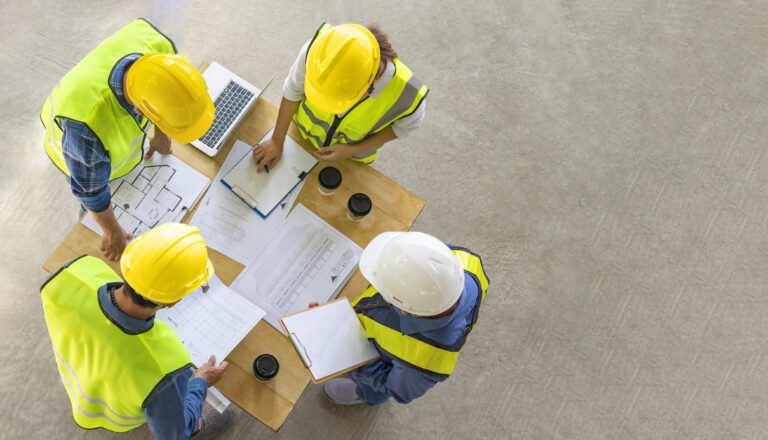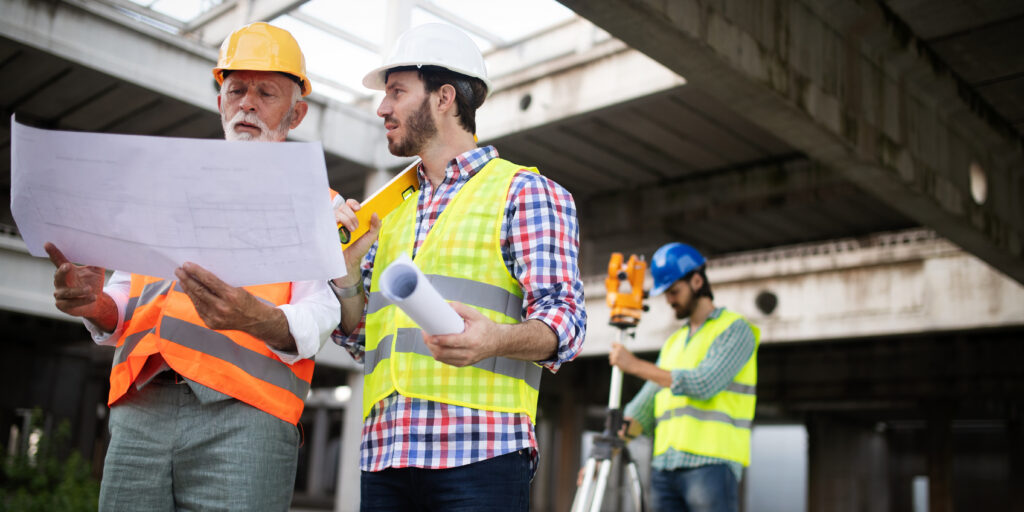— 7 min read
What is a Construction Management Plan?
Last Updated Mar 26, 2025
Last Updated Mar 26, 2025

A construction management plan (CMP) is a key document construction companies and their clients use to outline and guide how they will manage a construction project. It is often a digital document that a manager creates with a word processor that they then print and file in the office.
The CMP contains details and plans describing how teams will manage aspects that are central to the construction project, including:
- Programme schedules
- Resources and materials
- Logistics such as delivery routes
- Processes
- Budgets
- Risks
Table of contents
The Aim of a CMP
The aim of a construction management plan is to act as a roadmap showing how a team will carry out, manage, and complete a construction project from start to finish. Areas that a CMP aims to improve include:
Define Scope and Objectives
The CMP creation process aims to come to a common agreement and understanding with the client of the goals, scope, and deliverables of the project. The CMP clearly documents and communicates these areas to everyone involved in the work. Agreeing on the CMP before starting the project helps to make sure that the proposed process will meet the client’s expectations.
Coordinate Teams and Stakeholders
A CMP helps to improve coordination. It keeps all workers and stakeholders on the same page. Because the CMP records all of the key planning information, it provides an accurate guide for any questions or concerns that arise throughout the project. It gives guidance for how to maintain good communication. This can help when coordinating with neighbours and other individuals who the build phase may affect.
Manage Logistics and Supply Chain
One of the challenges of construction projects is working around certain logistics when planning processes such as delivery routes. School drop off times and commuting hours are two examples of logistical issues that may affect a project. Identifying and logging any logistical issues in the CMP helps to avoid delays or frustrations that could threaten the project’s success.
Overall, the aim of the CMP is to have a solid plan that addresses what the construction project needs to achieve, how to achieve it, and how to address any risks or challenges. This includes meeting regulations, legislation, and health and safety requirements.
Shape the Future of the Built Environment at Procore's Construction Summit
Engage with construction leaders and discover the latest technology and best practices that are driving change across the industry.

Who prepares a CMP?
There are a number of people involved in building a construction management plan — it’s not a solo effort. The project team builds the CMP collaboratively, led by the construction project manager or the construction manager.
Creating the most effective CMP requires input by the whole project team, including people in the site management and health and safety teams. The client and design team will also be able to contribute to building the CMP. The client typically sets the project scope and objectives, while the design team plans out the design and makes sure it is compliant with all regulations, confirming and documenting this in the CMP.
Who uses a CMP?
Everybody involved in a construction project uses and benefits from the construction management plan. Key stakeholders that use the CMP include:
+ The client
+ Construction project manager
+ Site managers
+ Project stakeholders
+ Main contractors and subcontractors
Benefits of CMPs
There are a wide variety of benefits that companies unlock by using a CMP, from better organisation to enhanced regulatory compliance. Here are some of the key benefits and how they improve the experience of a construction project:
Better Planning and Organisation
Using a CMP means construction teams have a detailed framework that shows how they will carry out the work for a project from beginning to end. This helps them to plan and organise actions more easily, as they already have a solid understanding of the order and schedule of different tasks. Better organisation means a smoother working experience for everyone involved, thanks to reduced confusion and less time spent working out what needs to happen next.
Improved Time Management
Thanks to improved organisation and planning, CMPs also enable better time management. Time management is important in construction, as clients have fixed expectations for when the company they hire will finish their project. If they don’t meet the schedule, the construction firm may have to pay damages to the client. CMPs help to reduce delays due to thorough scheduling and milestones, as well as providing frameworks for construction project managers to monitor progress.
Improved Safety
A CMP contains a detailed safety plan to document the strategies the construction company will use to make sure that the public and their workers are safe at all times. This could be by using hoarding, scaffolding, and by providing appropriate signage to help navigate the site. Since the safety procedures are an important part of the CMP, the health and safety teams put a lot of thought into them before the project starts. This means they can better prepare and protect workers and the public by following health and safety laws.
Enhanced Regulatory Compliance
While the CMP is not a legal document, it includes a lot of information about how a construction project meets the relevant regulations and legislation. CMPs require the creators of the document to outline how they will maintain compliance. It is also helpful to have this documented for reporting.
Challenges Affecting CMPs
While CMPs are clearly beneficial and may sound straightforward so far, that doesn’t mean that they’re easy or fool-proof. There are always challenges in construction projects, and the CMP is no exception. Here are some of the challenges that may arise in the creation or usage of a CMP:
Difficulty Identifying Risks
It’s important to make a note of all the potential risks in a CMP, but this can be challenging and means creators need to think about a wide range of risk areas, such as:
- + Health and safety
- + Finances
- + Operations
- + Sustainability
Accurately identifying and assessing all risk is complex and time-consuming, but doing so is vital. It’s a process that can delay completing the CMP.
Communication Barriers
While CMPs communicate the project plan in a consistent and clear way, there can still be issues. For example, if English isn’t everybody’s first language there can be communication barriers. Language aside, getting everybody involved in creating the CMP to agree and communicate effectively is difficult. People have different ideas of the best approach, and getting everyone to agree can be difficult if communication styles clash.
How Technology is Changing CMPs
There is already an element of technology used in the creation of CMPs — as mentioned, the person responsible usually creates it on a computer with a word processor. In the future, there is great potential to use more advanced technology to make the process of building a CMP more efficient. Here are some of the technological advancements that will help CMPs to evolve:
AI, Machine Learning and Automation
Generative AI has potential for enhancing the creation and usage of CMPs - you can use AI to automate some of the design process. Using Machine Learning (ML) can help identify where your company’s CMPs have had to change over time. This could make it possible to use predictive analytics and highlight areas that might become problems, so that a construction team can address them before they arise.
There is also the potential to use Generative AI chatbots to quickly search for information. Just as you can ask ChatGPT to perform tasks or give you information, you could ask a chatbot to find you information from within your CMP.
The key to making all of the above possible is data. The more project data and CPMs your company stores, the more potential you can unlock from AI, automation and ML technologies.
Internet of Things Devices
Internet of Things (IoT) devices in the form of sensors can help to create CMPs. IoT sensors collect data on lots of things, such as traffic, noise pollution and more. As more data is becoming available, companies can use it to plan in advance and avoid risk or challenges. They can gain insight into, for example, the risk of creating too much noise pollution in an already noisy area, or the busiest times on the road to avoid deliveries.
Construction management software
Construction platforms can help with many areas of the construction management plan, for example creating visual aids such as Gantt charts for programme schedules. In-built functionalities like data analytics, document control and financial management can also reduce the manual work of creating a CMP.
Categories:
Tags:
Written by
Tom Noctor
16 articles
Having worked in construction for many years both on the ground as an electrician and in the design space in roles such as BIM Manager, I witnessed the highly inefficient operations of our industry and also the amount of waste generated from project delivery. I am a Digital Construction Technologies advocate @Procore Technologies, supporting and guiding the construction industry in adopting/utilising technology to deliver projects in a lean sustainable manner.
View profileReviewed by
Nicholas Dunbar
29 articles
Nick Dunbar oversees the creation and management of UK and Ireland educational content at Procore. Previously, he worked as a sustainability writer at the Building Research Establishment and served as a sustainability consultant within the built environment sector. Nick holds degrees in industrial sustainability and environmental sciences and lives in Camden, London.
View profileExplore more helpful resources

Construction Document Software: Essential Tools for Project Success
Construction projects depend on extensive paperwork, including designs, contracts, RFIs, and compliance records. A single misplaced document can trigger delays, disputes, or compliance violations. Despite increasing digital adoption, many teams...

Construction Planning: A Guide to Successful Project Execution
Every successful construction project begins long before the first brick is laid. Indeed, behind each structure – whether a towering skyscraper or complex infrastructure project – lies a carefully crafted...

Leveraging Analytics for Better Financial Forecasting in Construction
Financial forecasting is a difficult task in any industry. In construction, where companies need to manage volatile material costs, labour shortages and variation orders on a daily basis, fluctuations in...

Strategies to Prevent Rework: The Importance of Clear Instructions
In construction, “rework” is the dreaded process of redoing tasks due to mistakes, quality issues, or safety concerns. This unnecessary work drains budgets through wasted materials and labour while causing...